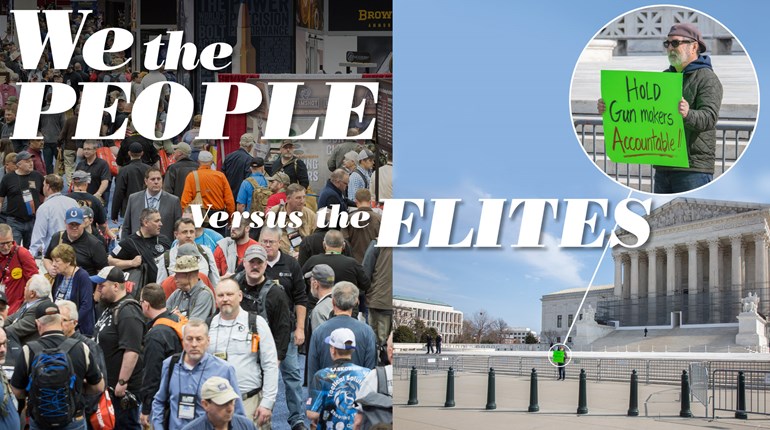
Everytown for Gun Safety wants to sell you something.
My father once advised me to “be skeptical of anything told to me by someone who had something to sell.” He was a car dealer whose business was mainly repeat customers—people who trusted him. On evenings and weekends, he drove new Chryslers, Plymouths, Imperials and Valiants to block parties and little league baseball games to show them off.
With his advice in mind, let’s look at the “study” that Michael Bloomberg’s Everytown for Gun Safety just released in Nevada. Everytown’s “research director,” Ted Alcorn, told the Las Vegas Review-Journal that, through the organization’s cutting-edge computer analysis and exhaustive man-hours of research, they have determined that approximately one in 11 online gun shoppers in Nevada could not pass a background check. By their reckoning, some 3,100 bad guys in Nevada have used this process to avoid a background check and buy a gun from unlicensed dealers. (Everytown was rebuked by the Vermont attorney general for a similar “study.”)
Everytown for Gun Safety is a political advocacy organization, not an independent, unbiased research entity.
Let’s start our examination of this “study” by stating the obvious: Everytown for Gun Safety is a political advocacy organization, not an independent, unbiased research entity. The organization is wholly funded by gun-ban billionaire Michael Bloomberg, who also funds the similarly anti-gun Mayors Against Illegal Guns and Moms Demand Action for Gun Sense in America. The group’s “findings” are not peer-reviewed, and appear in no scientific journals.
Everytown would like to sell the idea in Nevada that allowing the state to insert itself into every gun “transfer” is going to somehow make citizens safer. Such an assertion is, however, a conclusion looking for evidence, not the other way around.
If my dad had been your dad, this article could end right here. But, tragically, we can’t all be raised by car dealers, so we have to take a further look at this claim.
Everytown examined four websites: Armslist, Gunlistings, Facebook and Backpage. Everytown used different methods, over differing time periods, in their study: The organization claims to have used computers to analyze the first two for a year, but hired an investigative agency to manually analyze the rest for only six to seven weeks—not even over the same time periods.
Those latter time periods are too short to be statistically representative; events like the onset of hunting seasons, high-profile mass shootings and announcements of executive orders have obvious effects on firearm transaction totals. Six or seven weeks is not enough time to accurately extrapolate results—unless, of course, you’re deliberately trying to bias the results.
Alcorn also tells the LVRJ, “We wanted to ensure that we’re using the gun sale ads as a proxy for gun commerce,” he said. “You can infer a lot by looking at those ads.” In truth, he has to “infer” because he can’t prove that even a single gun changed hands (although some certainly did).
Alcorn’s breathless description of the effort involved may obscure the fact that Everytown was just counting gun ads. But he completely hides the fact that only 43 (1 percent) of the 4,179 unique ads on Backpage were verified as being from unlicensed sellers, and only 40 (4 percent) of the 962 Facebook ads were. Yet, from this tiny sample, Everytown assumes all 5,141 ads are from unlicensed dealers.
Here’s a sample of Everytown’s methodology: “A small number of sellers offered guns in higher volumes, which Everytown said might mean they were unlicensed dealers.” Hey, Ted, it also might mean they are licensed.
While Everytown has no clue, it’s likely the ATF does. Surfing the Web for criminal activity is a very effective law-enforcement technique: If unlicensed dealers post multiple guns for sale online, that’s the easiest way for federal agents to find them. Does Alcorn think ATF can’t type “Armslist” into a Google window?
Moving on, we find that Everytown’s researchers—“about 10 people,” according to Alcorn—estimate that 35,862 firearms were posted for sale by private parties. (Side note: How can they achieve such accuracy if they can’t even count fewer than a dozen staffers?) Given the aforementioned problems, this number is undoubtedly high, but Everytown clings to it like Velcro to Ebola. Read on.
“A small number of sellers offered guns in higher volumes, which Everytown said might mean they were unlicensed dealers.” Hey, Ted, it also might mean they are licensed.
Everytown then posted 19 sham gun ads of their own. They received 394 responses. Everytown claims they could only identify individual buyers in 229 of them … and 20 of them had felony convictions that would make them prohibited buyers.
Read that again. Out of 394 responses to their scam, Everytown found only 20 with records.
Based on this alone, Everytown’s study is propaganda—and not even good propaganda, at that. It wouldn’t pass any known sniff test with a reputable research firm, but Everytown’s problems don’t end here.
Consider, also, that a significant number of the guns posted for sale are long guns, bolt guns, antiques and other arms unsuitable for criminal purposes. Yet Everytown doesn’t filter them out. Also, responsible individuals often require a CCW from the buyer before selling, which serves as a de facto background check. Everytown doesn’t recognize this common practice, nor do they discount a single one of their phantom sales in consideration. And of course, we have to remember this isn’t peer-reviewed, so we have no idea if Everytown’s explanation of their approach actually ever happened in the first place.
However, this doesn’t mean Everytown’s “study” won’t be used for political purposes, even if it amounts to nothing more than biased nonsense. I would bet my next paycheck that, sometime between now and the first Tuesday in November, Nevadans will hear a politician or advocate or journalist cite Everytown’s study and claim “one in 11 online gun sales goes to a criminal.” In fact, I bet they’ll hear it more than once—way more. Any takers? No?
In Nevada this summer, at backyard cookouts and cocktail parties, you’ll hear this argument. You might be in the center of it. You might even hear someone cite this study, and when you unravel it, you may hear someone say, “Well, stats can be made to prove anything. I mean, both sides have their studies, right?”
Right there—that’s the difference between them and us. Like Everytown, the NRA is a political advocacy organization. However, unlike Everytown, the NRA doesn’t manufacture “studies” in order to back up our positions. There are no headlines touting a “new NRA study” because we don’t pretend to be something we’re not.
We have something to sell, too. The difference is, we’re willing to let the facts speak for themselves.


































